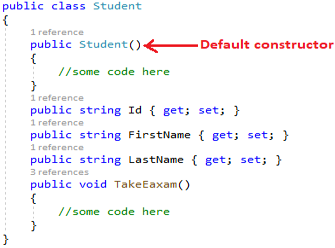What is a Default Constructor in C#? Explained with Examples
Short Answer
A default constructor is a constructor without any parameters. It initializes the fields of a class to their default values (e.g., numeric types to 0, strings to null, and booleans to false). If you don’t define any constructor in a class, the compiler automatically provides a default constructor.

Detailed Explanation with Examples
What is a Default Constructor?
A default constructor is a special method in a class that is automatically called when you create an instance of that class. It doesn’t take any parameters and is used to initialize the object’s fields or properties to their default values.
For example:
- Numeric fields (like
int, float, double) are initialized to 0.
- String and object fields are initialized to
null.
- Boolean fields are initialized to
false.
If you don’t define any constructor in your class, the C# compiler automatically generates a default constructor for you. However, if you define any constructor (even one with parameters), the compiler won’t provide a default constructor unless you explicitly define it.
Why is the Default Constructor Important?
The default constructor is important because:
- Initialization: It ensures that all fields in your class are initialized to default values, preventing unexpected behavior in your program.
- Simplicity: It allows you to create objects without passing any parameters, which is useful when you don’t need custom initialization.
- Backward Compatibility: If you later add parameterized constructors, the default constructor ensures that existing code (which relies on no-parameter instantiation) continues to work.
Example of a Default Constructor
Let’s look at an example to understand how the default constructor works.
Step 1: Define a Class with a Default Constructor
Here’s a class called MyClass with two properties: MyValue (an integer) and MyText (a string). Since we haven’t defined any constructor, the compiler automatically provides a default constructor.
public class MyClass
{
public int MyValue { get; set; } // Numeric field
public string MyText { get; set; } // String field
// Default constructor (automatically generated by the compiler)
public MyClass()
{
// MyValue is initialized to 0 (default for int)
// MyText is initialized to null (default for string)
}
}
Step 2: Create an Instance Using the Default Constructor
When you create an instance of MyClass using the default constructor, the fields are initialized to their default values.
MyClass obj = new MyClass();
Console.WriteLine($"MyValue: {obj.MyValue}"); // Output: MyValue: 0
Console.WriteLine($"MyText: {obj.MyText}"); // Output: MyText:
In this example:
MyValue is initialized to 0 (the default value for integers).MyText is initialized to null (the default value for strings).
What Happens if You Define a Constructor?
If you define any constructor in your class (even one with parameters), the compiler will not automatically generate a default constructor. In such cases, you must explicitly define a default constructor if you need it.
Example:
public class MyClass
{
public int MyValue { get; set; }
public string MyText { get; set; }
// Parameterized constructor
public MyClass(int value, string text)
{
MyValue = value;
MyText = text;
}
// Explicitly defining the default constructor
public MyClass()
{
// MyValue is initialized to 0
// MyText is initialized to null
}
}
Here, we’ve defined both a parameterized constructor and a default constructor. This allows you to create objects in two ways:
- Using the default constructor:
MyClass obj1 = new MyClass();
Console.WriteLine($"MyValue: {obj1.MyValue}, MyText: {obj1.MyText}"); // Output: MyValue: 0, MyText:
- Using the parameterized constructor:
MyClass obj2 = new MyClass(10, "Hello");
Console.WriteLine($"MyValue: {obj2.MyValue}, MyText: {obj2.MyText}"); // Output: MyValue: 10, MyText: Hello
Key Points to Remember
- Automatic Generation: If you don’t define any constructor, the compiler automatically provides a default constructor.
- Default Values: The default constructor initializes fields to their default values (e.g.,
0 for numbers, null for strings, false for booleans).
- Explicit Definition: If you define any constructor, you must explicitly define the default constructor if you need it.
- Use Cases: The default constructor is useful when you want to create objects without passing any initial values.
Real-World Analogy
Think of a default constructor like a factory reset for a smartphone. When you buy a new phone, it comes with default settings (e.g., no apps installed, default wallpaper, etc.). Similarly, when you create an object using the default constructor, it starts with default values for its fields.
Final Thoughts
Understanding the default constructor is essential for working with classes and objects in C#. It ensures that your objects are properly initialized, even when no custom values are provided. Whether you’re preparing for an interview or writing production code, knowing how and when to use the default constructor is a valuable skill.